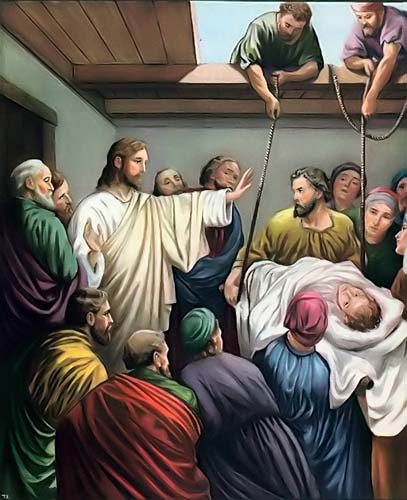The Gospel and Universal Health Care
Jesus sent his disciples to proclaim the gospel that:
The kingdom of heaven has come near. Heal the sick, raise the dead, cleanse those who have leprosy....
Matthew 10:7-8 and Luke 10:9
I was sick and in prison and you did not look after me. They also will answer, 'Lord, when did we see you hungry or thirsty or a stranger or needing clothes or sick or in prison, and did not help you?
He will reply, 'I tell you the truth, whatever you did not do for one of the least of these, you did not do for me.
Matthew 25:43-45
Love your neighbor as yourself.
Matthew 22:39
Healing the sick was a huge part of Jesus' ministry and the gospel he preached and lived. It's also something we are commanded to do. There is no single thing that Jesus is recorded in the gospels as doing more than healing the sick. The kind of health care Jesus provided, and commanded his followers to provide, put no limits on what sicknesses it covered or who it covered. It was universal health care.

Today, all industrialized countries have universal health care. Save one, the richest one of all, the United States. The number of uninsured Americans is now over 50 million. The number of underinsured is at least another 25 million.
The United States is the worst industrialized nation in the world in preventable death rankings. This is mostly due to the millions of American's without health insurance. In fact, over 100,000 Americans die each year due to our poor health care system.
And this lack of health insurance causes people to avoid going to the doctor for routine and preventative care leading to more serious, and expensive, health care problems later. Often the result is inability to pay for medical care and bankruptcy. In fact, medical costs are far and away the top cause of personal bankruptcies with over 62% of personal bankruptcies caused by overwhelming health care costs.
Even those who have insurance struggle more and more to afford it. This hits both businesses and employees hard. In fact, the cost of health care coverage is the fastest growing expense in our society having more than doubled since 2001.
The lack of universal health care in the United States disproportionately affects the poor and/or unemployed. That's pretty obvious. But, it also targets young people. Adults in their 20's are one of the fastest growing groups of people who lack health insurance. More and more employers do not offer health insurance to their new employees. And, as the healthiest part of the population shrinks as a percentage of those covered, health care plans get more expensive for the remaining pool that is generally older and has more health care needs.
Most people say, ok, fine universal health insurance would be nice, but we can't afford it. That's where the "single-payer" part comes in. Only through one payment source for universal health care can costs be reduced. This is just reality. Single-payer universal health care is the only way health care costs have ever been reduced in the modern age.
It's important to understand that nearly any system would be more cost-effective than the one we have now. The current health care system in the United States is the most expensive, inefficient and irrational health care system the world has ever known.
We lead the world in health care spending. We spend over 15% of GDP on health care and it's climbing. Great Britain (for instance) spends about 8%. Our GDP is now over 15 Trillion a year. So, take 7% of 15 trillion and you get 1.05 Trillion. That's a conservative number, which, of course, is always rising.
Furthermore, it doesn't take into account the positive health and economic impact of everyone getting health care or the positive economic effect of eliminating the #1 cause of personal, business and governmental bankruptcies. Nor does it account for increased competitiveness of our industries when they don't have to pay for health care. All in all, we are talking in the trillions in savings and increased economic activity if we had a national health care system similar to what the rest of the industrialized world has.
Yet, despite the exorbitant costs we pay, we trail almost every industrialized (universal health care) country in the world in infant mortality, life expectency, immunizations, and many disease outcomes. According to the census bureau 45,000 Americans die each year due to lack of health insurance.
In other words, we spend the most and get the least.
"Single payer" does not mean "socialized." The medical services we receive would still be provided by the mostly private medical providers who serve us today. The difference is that all funding would come from the government and this would cut down dramatically on administrative costs, duplicative paperwork, multiple insurance rules, etc, etc.

Some of you may be saying -- but the government is always more inefficient than the private sector. First, again, I'd say -- give me a break. No system can be more inefficient and expensive than the one we have now. Besides, private industry has been promising to be more efficent and cut costs for many decades now. Yet, the costs rise and rise. The truth is that government overhead, comparing medicare with private insurance, is 15 times lower (2% vs 30%) than private health care.
So, universal, single-payer health care would be more moral, more Christian, good for business and cost less than what we have today. If you need more reasons, here are ten more.
So, why don't we do it? That's obvious. Our political system is heavily influenced by those with money. And, the health care industry has lots of money. It takes it from us (that crazy 30% overhead I was talking about). Perhaps simpler, maybe intermediate, step in the right direction would be to simply offer a public option.
If you have any objections at all, they can be answered at single payer FAQ's. Of course health care reform is a huge issue and can't be covered comprehensively in one article. But, honestly, if you click through to the links on this article, you will find the answer to every question you might have.
As followers of Jesus, we are called to live out the gospel; and that certainly includes caring for the poor and the sick. Of course we can do that through individual efforts -- like volunteering to help at health clinics. We also can pray for the uninsured. But, the most significant thing we can do, the thing that can help the most people, is to cast our political votes for leaders who will enact public policies to bring about universal, single-payer, health care. That's the only way we can hope to care for the tens of millions of people (our neighbors) who have inadequate health insurance or none at all. It also would be good for American business and go a long way to fixing our deficit problems.
We can be good citizens and at the same time Jesus' agents of healing by supporting single-payer, universal health care. Here's information about how you can help make national single-payer healthcare a reality.
The Gospel and Universal Health Care Articles:
- Business Should Support National Health Care
- The Selfish and Wasteful American Health Care System
- Anyone Know the Reason for Leviticus 12:1-5?
- Regarding the Health Care Debate
- "Pro-life" Christians should support national health care
 Custom Search
Custom Search